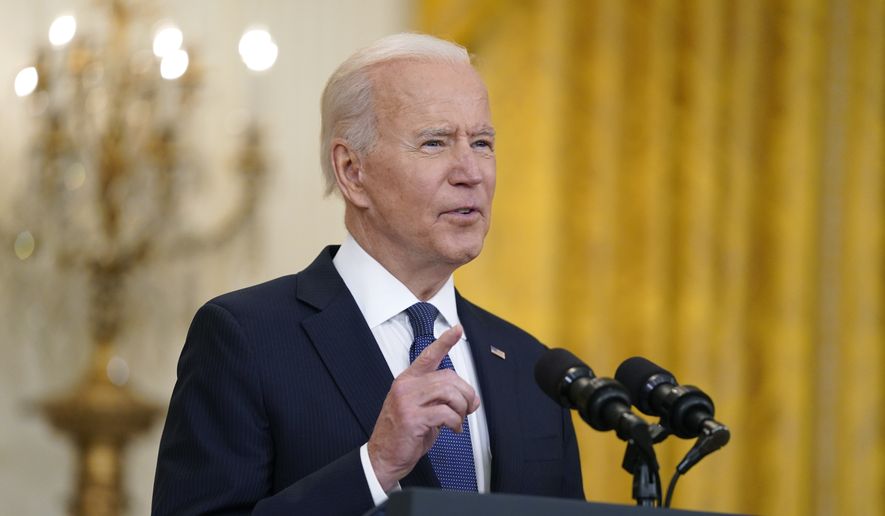President Biden on Monday dismissed concerns that expanded federal unemployment benefits are discouraging people from returning to work, saying “we need to stay focused on the real problems.”
The president, who has been thwarted in his efforts to raise the federal minimum wage to $15, also said businesses that received more than $1.4 trillion in COVID-19 relief last year should use some of that taxpayer money to boost wages to entice employees back to work.
“People will come back to work if they’re paid a decent wage,” Mr. Biden said in an address on the economy at the White House. “My expectation is that, as our economy comes back, these companies will provide fair wages and safe work environments. And if they do, they’ll find plenty of workers.”
Hiring in April slowed to weaker-than-expected 266,000 jobs, the government reported on Friday. The U.S. Chamber of Commerce blamed the $300-per-week federal jobless benefit for encouraging Americans to stay at home.
“Paying people not to work is dampening what should be a stronger jobs market,” the Chamber said in a statement.
The president rejected that explanation.
“I know there’s been a lot of discussion since Friday’s report that people are being paid to stay home, rather than go to work, but we don’t see much evidence of that,” Mr. Biden said. “Look, it’s easy to say … because of the generous unemployment benefits, that is a major factor in labor shortages. Americans want to work. I think the people who claim Americans won’t work, even if they find a good and fair opportunity, underestimate the American people.”
Still, the president said the administration will make clear that the law calls on people to accept “suitable” job offers instead of collecting unemployment benefits.
“No one should be allowed to game the system,” Mr. Biden said. “But let’s not take our eye off the ball. We need to stay focused on the real problems in front of us — beating this pandemic and creating jobs. For many of those folks, unemployment benefits are a lifeline. Families who are just trying to put food on the table, keep a roof over their head, they aren’t the problem.”
The president’s line on wages parrots the most liberal members of his party. Senate Budget Committee Chairman Bernard Sanders of Vermont said rather than the government rescinding the $300-per-week additional unemployment benefit, companies should “end starvation wages.”
Responding to the Chamber of Commerce, Rep. Ilhan Omar, Minnesota Democrat, tweeted, “The interests of big business are at war with the interests of the working class. They will spend millions of dollars to take $300 a month away from you and your family, to force you to work for them for pennies. Their greed has no bounds.”
Republican Sen. Ben Sasse of Nebraska said Mr. Biden “is all over the place on unemployment insurance.”
“He wants to go after folks who are gaming the system, but he’s denying the reality that his policies are making the situation worse, so he’s trying to make struggling businesses the boogeymen,” Mr. Sasse said. “Bad federal policy is making unemployment pay more than work and millions of jobs aren’t getting filled. President Biden and his party were warned this would happen, but they doubled down on bad policy. Instead of making unemployment pay more than work, we ought to convert the emergency unemployment payments into signing bonuses.”
Chipotle restaurants said Monday it will offer an average hourly wage of $15 and employee-referral bonuses by the end of June as it seeks to hire 20,000 people amid a tight labor market.
The company said hourly wages for “crew members” will range from $11 to $18 once its plans are in place and workers can earn a $200 bonus for referring workers or $750 for recommending general managers and other positions.
Restaurant chains such as Chipotle, McDonald’s and Papa John’s are scrambling to find workers to execute their growth plans as people remain on the sidelines of the labor market.
The administration on Monday also announced the distribution of $350 billion in emergency coronavirus aid to states and cities, bailing out budget coffers and weighting the money to states with higher levels of unemployed workers.
Treasury officials said states and cities will have great discretion on how they spend the money, but they can’t use it to offset any tax cuts.
New York City topped the list with more than $4.2 billion in aid, followed by Chicago with more than $1.8 billion and Los Angeles with $1.2 billion. San Francisco, home to House Speaker Nancy Pelosi, came in at $453.5 million.
Among states, California will receive $27 billion, Texas will get $15.8 billion and New York is receiving $12.7 billion. The District is receiving about $1.8 billion.
Treasury Secretary Janet Yellen said the states and localities can use the money, part of the American Rescue Plan signed into law in February, to “fill revenue shortfalls” and support communities hardest hit by the pandemic.
“With this funding, communities hit hard by COVID-19 will be able to return to a semblance of normalcy; they’ll be able to rehire teachers, firefighters and other essential workers — and to help small businesses reopen safely,” Ms. Yellen said.
She said the funding “will create jobs and help fuel a strong recovery.”
The money is arriving as the economy steadily improves, with employers adding more than 1 million jobs in the first four months of the year.
Mr. Biden also is calling on Congress to approve more than $4 trillion in additional spending for infrastructure rebuilding, child-care programs and many other agenda items.
⦁ Tom Howell Jr. contributed to this report.
• Dave Boyer can be reached at dboyer@washingtontimes.com.




Please read our comment policy before commenting.